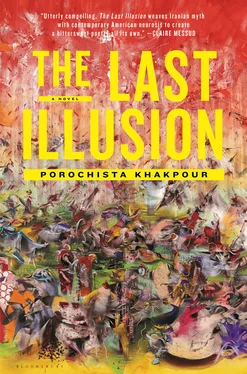“There are only wrong things inside of me,” Zal thought out loud, “so, no.”
“Time is running out right now, Zal.”
“Is it? I thought you said you didn’t believe it.”
“I did, didn’t I?” She paused. “I don’t know what’s happened to me, Zal. I mean, I’ve been a strange bird all my life. .”
Strange bird. He had heard that expression before. It was a saying. He loved that saying. He was a strange bird, too.
“You are, Asiya,” he said, matching her whisper, “but, you know, so am I. More than you. More than anyone.”
And there in the darkness he heard it, like peals, a skipping bell-toned vocalization, that thing he could not do, as much as he tried: a true laugh.
“Oh, yes, you are!” she said, laughing.
“You laughed.”
“So?” she said.
“I can’t,” Zal said.
“Oh, stop!”
“I’m serious.”
“What the fuck?” she snapped, and Zal knew the only way to melt her effing hardness again was to give in to that darkness and safety that this abnormal world of theirs had suddenly inspired in him and tell everything, right then and there.
“I was a bird.”
Asiya took a step back, as if bird were a synonym for serial killer .
He cleared his throat and started over. “I mean, I was raised among birds. I was raised as a bird. It’s a long story.”
For a while she just blinked, silent. Finally she said, “I have all the time in the world,” without, for once, thinking that she might not.
The story lasted that eternity between life and the possibility of no-life. It was his second time telling the story, and he felt it unravel less clumsily than it had with Silber. The off feeling was always there, but he had struggled to bury some of the odds and ends of the narrative so deeply that he was surprised to hear it all come together. There was something about the power of recollection that seemed to blur the lines — story became cinema became existence. There he was in a foreign dry heat, a land yellow and black, the mother country he got only a window’s view of, his eyes with nowhere to look but at his own kind — what he knew as his own kind — and their motionless marble bead-eyes that had nothing for him but cold empty allegiance to some god of oblivion. And there he was, his body just a mass of bones held together by broken filthy skin, squatting against walls of twisted wire that his limbs would fight against with each passing year, his bare feet only able to shuffle here and there on the mess of shredded newspaper and straw — always damp from urine and sweat and feces and blood — and the only nice thing in there, the one thing he could never have, feathers, that glorious evidence of wings from the many around him, from all around him, that somehow swirled through the dead air like the fresh flurries of an early New York winter.
Her arms broke the spell he felt, indeed, encaged by; she held him and held him and held and sobbed and sobbed and sobbed — but not in the panicked way; in the moved way, he thought, he hoped. And when they left that dark basement finally (a “wine cellar,” she clarified later), Willa and Zachary met them with looks even he could tell were funny.
“What?” Asiya: instantly annoyed when confronted with them.
Willa let out a soft husky giggle; Zachary a sort of disgusted groan.
Willa pointed to the television. On TV, a sitcom Zal vaguely recognized played, the old one with the stand-up comedian and his short bald neighbor and tall crazy neighbor and that girl, all in New York. The characters were all arguing in the comedian’s giant apartment, interrupted here and there by recorded laughter.
“Oh my God, what time is it?!” Asiya’s voice suddenly broke into a violent exclamation, her whisper altogether gone.
“Game over a while ago, Oz,” Willa said, just as Asiya shoved her watch at Zal.
12:37 a.m.
Zachary got up, still in headphones and with his smoking drug, and went to his room, slamming the door behind him. They rolled Willa into the elevator and up to her floor and exchanged good nights, Zal lingering just a bit at the door, to try to etch her form and all its infinite comforts in his mind.
In the empty living room, they stood in silence, not sure what to do with each other now. Zal tried to read her, but she seemed every instant to be made up of a different emotion: annoyance, fury, relief, euphoria.
“Zal, thank you,” she said in the ecstatic mode.
“For what?”
“For making the time pass, I guess,” she said. “For sharing your story.”
“We’re alive.”
“Yes.”
“Thank you for hearing it. I have never told anyone, really. I mean, the people that know know, but no one else. I don’t know many people.”
“I can tell,” she said, and just like that laughter that had been drawn out, something like a small smile revealed itself. She wore it much better than he guessed. With that embellishment, the stick figure became a girl almost.
They were silent for a few more moments.
“Well, it’s time to sleep now,” she said. “You should go home.”
“I should go home,” Zal quickly echoed, so embarrassed he had forgotten any notion of his home. This entire milestone of a day had made him feel like he was on another planet, not just some dozen blocks from his apartment. He suddenly felt totally out of touch with himself outside Asiya and her world. He did not understand how that could be possible, how the encounter could hold such power. He did not really understand what was happening, but he thought that it was worth thinking that it may be good.
“Okay,” she said. “I’m sleepy for once. I couldn’t imagine sleeping tonight, and look. Yawning. Amazing. Thank you.” She took his hand and walked him to the door and they embraced again.
“Thank you,” he said, but she did not know he meant for the hug, which both times had felt less bad than he would have thought from Asiya’s body, though it did make him wonder a bit how much better Willa’s might feel.
“It’s easy to say goodbye to you, because I know I will see you again — I know things, remember” were her final words to him, final if you didn’t count the words on a scrap of torn paper: asiya mcdonald / see you soon and a phone number.
This, he realized, was a big deal, romantic or not, though he knew it was a step toward romance for sure.
He had a girl’s number.
He had a human’s number.
For the first time in his life, Zal Hendricks felt a certain coloring in of himself — a hologram being filled in to flesh; a ghost suddenly acquiring corporeality — and he thought maybe he was finally there, that this was it: normalcy.
The crows like to insist a single crow is enough to destroy heaven. This is incontestably true, but it says nothing about heaven, because heaven is just another way of saying: the impossibility of crows.
— Franz Kafka, The Zürau Aphorisms
Zal saw Asiya McDonald soon indeed. He called her the next day to thank her for a nice New Year’s “gathering”—it took him more than an hour to pinpoint the best word for that strange day, that strange night. She had been quiet at first and suddenly said, “Want to come over? I mean, I want you to come over if you want to.”
Suddenly it seemed everyone wanted him. He had an e-mail from Silber’s address, disappointing especially for its sign-off, “xoxo Indigo”: What. The. Fuck, Chuck? Too cool for school? Party was a blast. Happy 00. See u soon! He had a note from his father, who had left his apartment when he got his note: I hope you (and whoever this friend is, wow!) had a nice New Year. Happy New Year, son. Please call soon. Love, Pops.
Читать дальше












